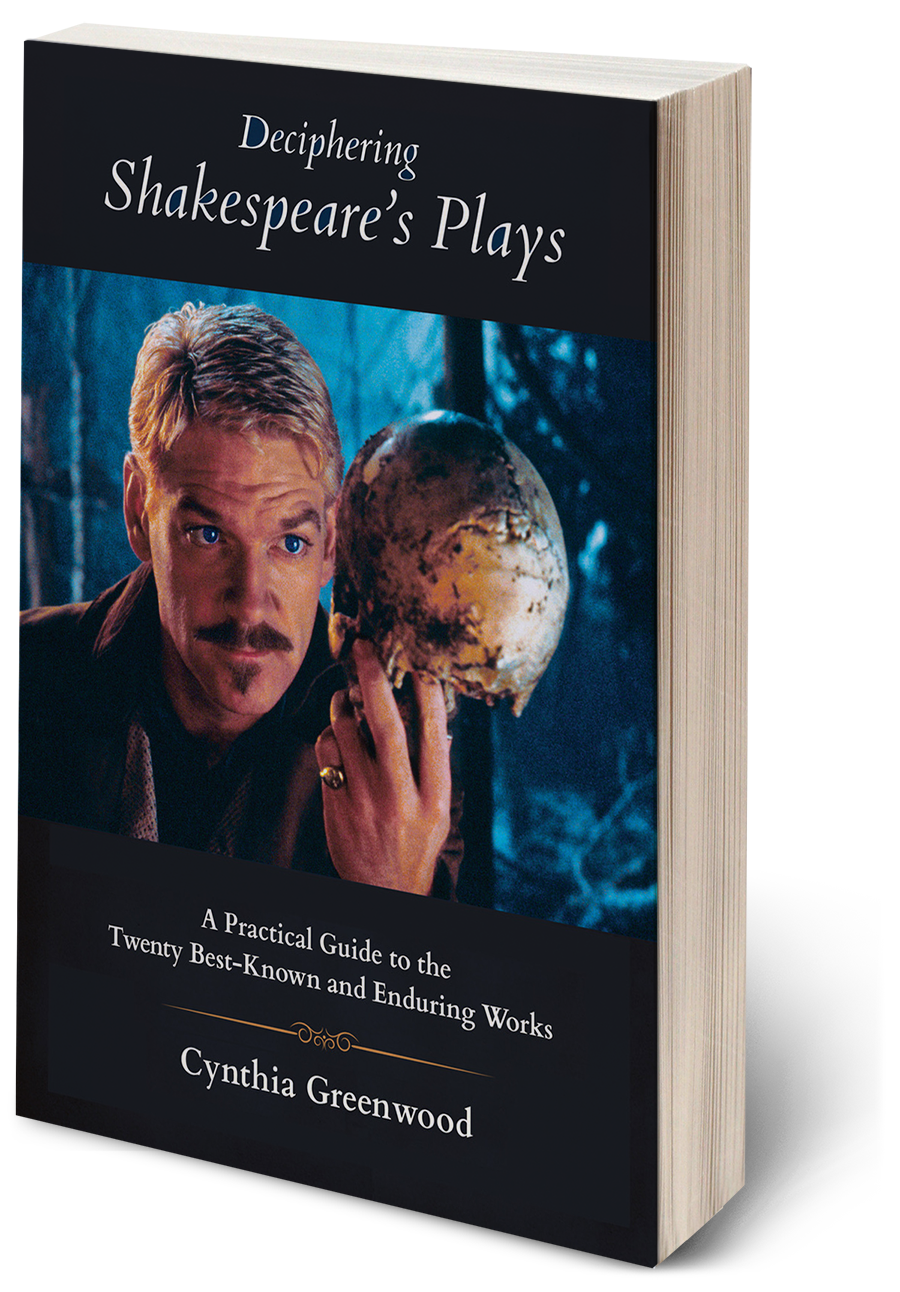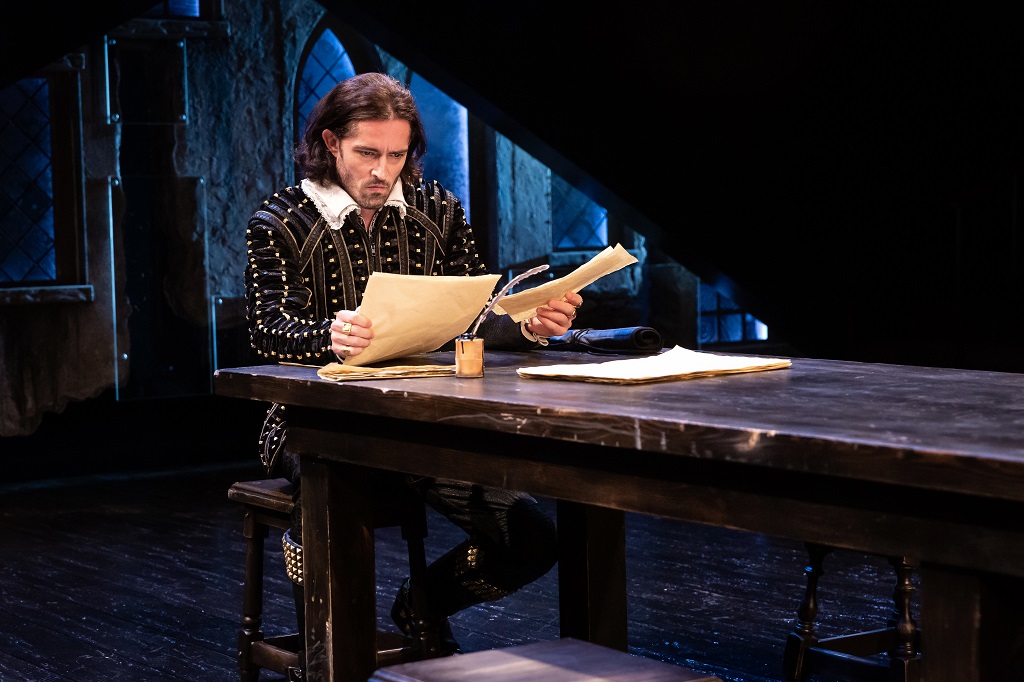
In Born with Teeth, a 2022 world premiere on view at the Alley Theatre in Houston, playwright Liz Duffy Adams introduces us to the wildly attractive notion that William Shakespeare, the world’s greatest playwright, actually collaborated with his famous Elizabethan rival, Christopher “Kit” Marlowe, on the Henry VI history cycle from 1591-1593.
In her new play Adams chose to revisit this moment after absorbing a radical claim set forth by editors of the New Oxford Shakespeare in 2016. Using computer-based stylometric analysis of word frequency in Shakespeare’s plays to determine who (besides Thomas Nashe) may have contributed to the Henry VI history cycle, the editors concluded that specific sections of two of the plays were composed by Marlowe himself. Surprisingly, the editors also attribute Henry VI, Part I to Marlowe, Nashe, and an anonymous playwright (although they believe Shakespeare adapted the play after it was written).
Although these claims have attracted plenty of detractors among scholars who present plausible counter-arguments, they created quite a stir in the press after the edition was published.
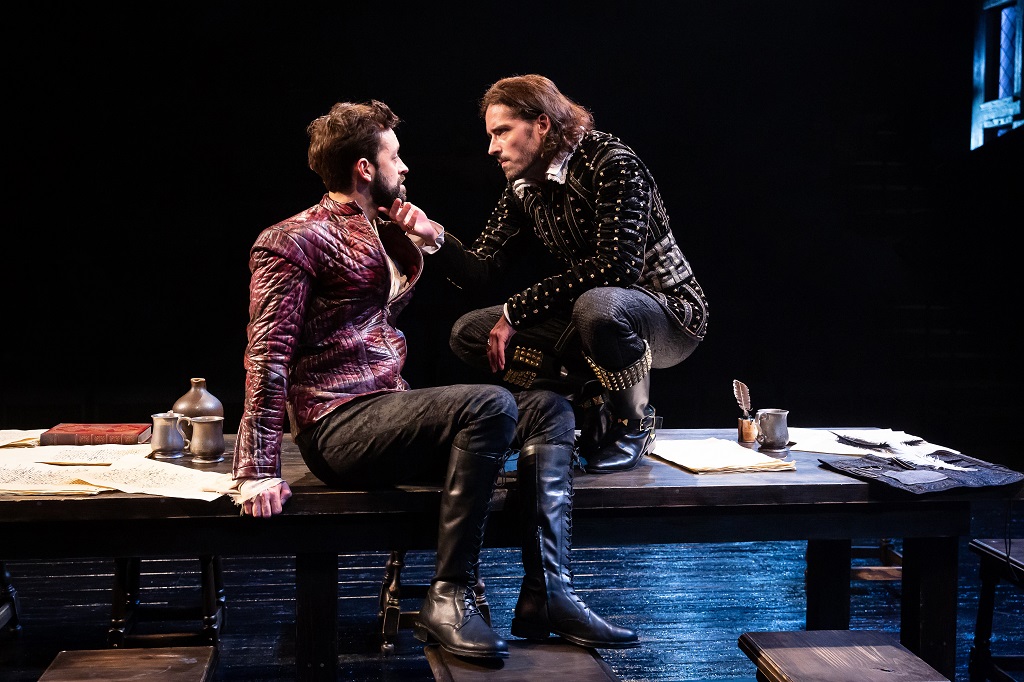
As a young teen and a struggling actor who also aspired to write plays, Adams was drawn to Shakespeare. She became intrigued by the idea of writing a play about Marlowe because he was allegedly a spy. When the New Oxford Shakespeare editors posited an active collaboration between Shakespeare and Marlowe, the controversial claim certainly caught her attention. “Instantly I felt that thrill you get in the soles of your feet and the palms of your hands, and I knew I could write it,” she said in a Playbill interview.
When Shakespeare is thought to have worked on the Henry VI cycle from 1587-92, his play writing career was just gaining steam. By this time, Marlowe, who was the pre-eminent dramatist on the Elizabethan stage who pioneered the technique of blank verse, had at least three popular plays to his credit, including Tamberlaine the Great, its sequel, and The Jew of Malta. The action of Born with Teeth extends from winter 1591 through May 1593, at a time when Marlowe was supposedly working as a secret operative on behalf of Sir Robert Cecil, who by 1591 served as the ruthless spymaster of Queen Elizabeth I.
During part one of Adams’ drama, it is winter 1591 and the earnest poet and player from Stratford- upon-Avon has two plays to his name – The Two Gentlemen of Verona, a comedy, and Titus Andronicus, a real slasher revenge tragedy. An overbearing Marlowe, boasting a degree from Cambridge, struts into the private room of a London tavern, clad in a gold-studded doublet and matching boots. There he proceeds to lord his fame and university pedigree over his collaborator, who is the son of a glover and a dramatist with much more to prove.
At the outset Marlowe announces to Shakespeare that there are more spies in England than there are crimes to investigate. Marlowe would know, of course, because he happens to be one of those spies. More than once he brags about having the powerful Cecil as his protector, despite having a reputation for being “in and out of trouble” wherever he goes.
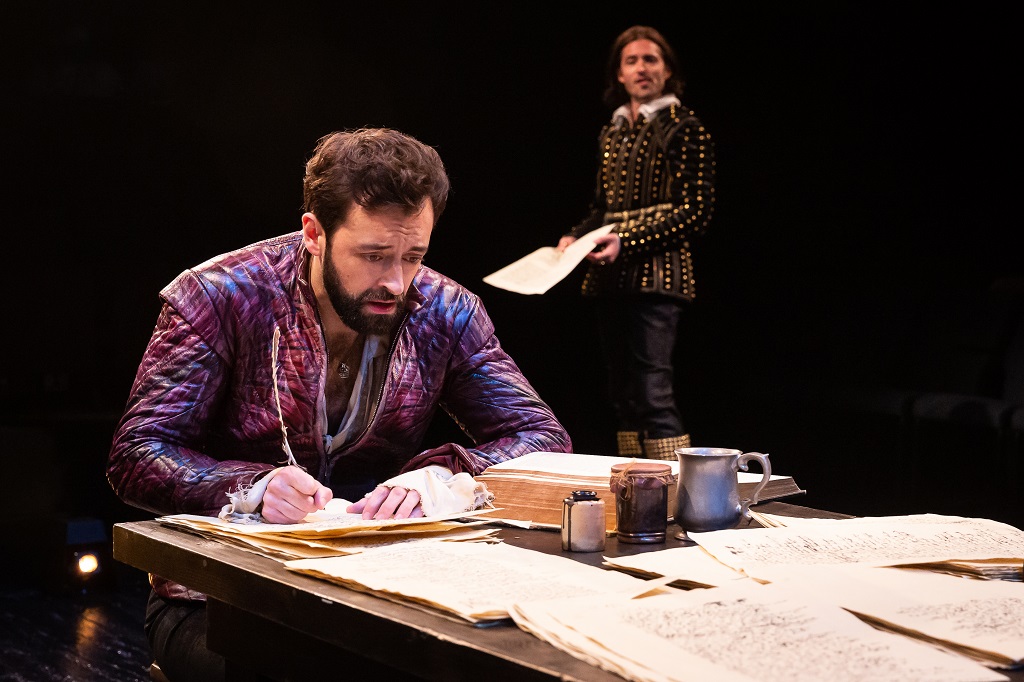
Before exploring how Shakespeare and Marlowe get down to the business of writing scenes featuring Joan of Arc in Henry VI, Part I, and the famously explosive Jack Cade rebellion in Henry VI, Part 2, Adams starts the action with a five-second tableau in which both men are being tortured. This jarring scene ratchets up the suspense, underscoring the reality that writing plays for court and playhouse performance is an extremely dangerous game. One single literary misstep — perhaps a single verse that unwittingly casts aspersions on a monarch — could be grounds for treason. London scriptwriters knew they were literally saving their own heads by avoiding material that would draw the attention of the queen’s censors.
In their tavern work space, with apparent mutual distrust, the two divide up the work required to produce a history cycle commissioned by Lord Strange, a patron who sponsored the Admiral’s Men, a company of players who performed at the Theatre and the Rose playhouses in the City of London.
Amid both men’s frequent sparring about how key scenes should be approached, a self-important Marlowe is quick to demean the talent and the work ethic of Shakespeare, his lesser-known peer. (I should interject that during the performance that I watched, I couldn’t decide if Adams’ characterization of Marlowe was excessively flamboyant and cocky, or if director Rob Melrose could have demanded a more nuanced performance from actor Matthew Amendt.)
Adams’ story imagines that Marlowe, the principal author of the gorgeous narrative poem Hero and Leander, feels more at home as a relentless interrogator than a professional dramatist. He delights in badgering Shakespeare with poignant questions about his personal life and religious identity, questions that get to the heart of the same mysteries that bedevil serious Shakespeare biographers today.
Curious about how a family man with ties to Stratford manages to sustain a long-distance marriage, Marlowe asks whether Shakespeare actually loves his wife. If so, how does he manage to work in London and live apart from her? There are different forms of love, Shakespeare insists, making us wonder if his heart belongs to someone else.
Risking Shakespeare’s ire time and time again, Marlowe is open about his suspicion that Shakespeare must certainly be attracted to men, as though he had foreknowledge of the beautiful sonnets that were yet to be written and circulated on behalf of Shakespeare’s patron, the Earl of Southampton. Amid persistent sparring and cajoling, Adams allows a sexual attraction to unfold between the two professionals, one that seems to deepen as their scriptwriting progresses.
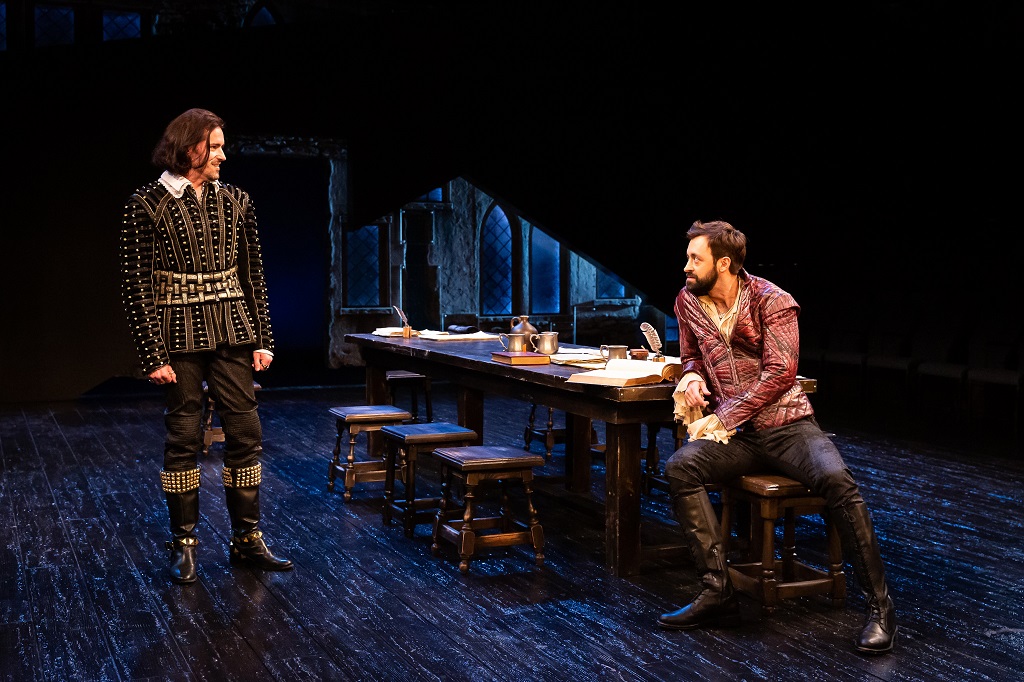
Marlowe grills his friend about a highly controversial issue central to the life of all Elizabethans. Does Will embrace Catholicism, a religion deemed heretical and illegal during Queen Elizabeth’s reign? Or does he support the official Protestant Church of England? And are his family closet papists? Worn down by Marlowe’s probing about religion, Shakespeare finally admits, “My family are secret Catholics,” while insisting that he is not.
While Adams is adept at using Marlowe, the professional spy, to expose his co-author’s personal secrets, she also elegantly crafts scenes that explore the ingenuity of Shakespeare’s writing process, his sensitivity to the censors, his ostensible knack for pleasing court and playhouse audiences, and his penchant for romance and reinvention.
As the two men quibble over the best way to portray Joan of Arc in the later scenes of Henry VI, Part I, Marlowe disparages the young maid of Orleans as nothing but a whore and a witch. Shakespeare seems to disagree, wisely sensing an opportunity to depict Joan as a more tragic figure. His reaction bespeaks a skillful presaging of the revisionist view by later audiences and scholars that the authors’ reliance on sources such as Rafael Holinshed and Edward Hall to depict Joan of Arc in Act 5 was misguided.
At one point when Marlowe reads aloud his own infamous lines centered on Jack Cade’s rebellion in Henry VI, Part II, Shakespeare insists that officials will disapprove of the popular insurrection. Marlowe demurs, always eager to take risks, and confident that Cecil will protect him from any such charge. As the two revisit the scene, Shakespeare cleverly intersperses reactions to Cade’s speeches that would erase any perception that the playwrights’ intentions were subversive.
Throughout their writing sessions and prickly exchanges about God, religion, and love, Adams gradually places Shakespeare in thrall to Marlowe, making him seem more and more vulnerable to a man whose job it is to denounce traitors. At one point a frustrated Shakespeare asks, “Are you recruiting me or spying on me?” Eventually, we in the audience have to wonder, to what purpose would Adams force two collaborative scriptwriters to become potential adversaries?
Adams eventually provides a shocking answer to that question that I won’t reveal here; but the resolution of her tale involving the machinations of spies is the weakest part of her invention. Born with Teeth is most novel and intriguing when Adams puts us inside that tavern backroom, allowing us to witness two iconic Western dramatists handling their quill pens and parchment, while arguing passionately about how dramatic poetry should be written.
This feature was originally published at www.PlayShakespeare.com.

Consider me a professional interpreter of William Shakespeare for intelligent readers who never warmed up to the world’s greatest playwright in high school or college. I delight in helping modern readers and audiences translate iconic texts, especially antiquated dramatic works that were meant to be experienced inside the theatre.

